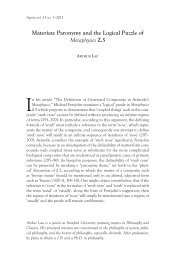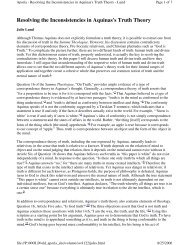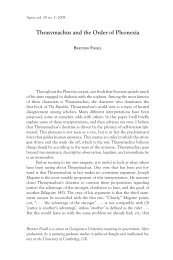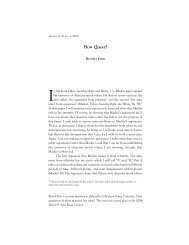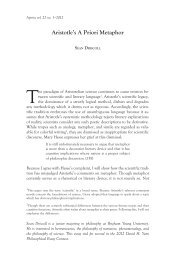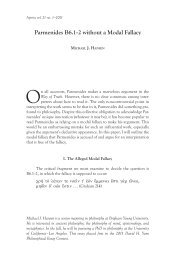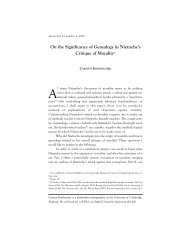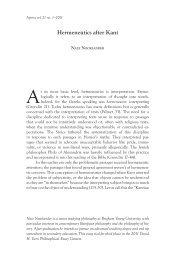A Proposed Counterexample to Klein's Theory of Knowledge - Aporia
A Proposed Counterexample to Klein's Theory of Knowledge - Aporia
A Proposed Counterexample to Klein's Theory of Knowledge - Aporia
You also want an ePaper? Increase the reach of your titles
YUMPU automatically turns print PDFs into web optimized ePapers that Google loves.
<strong>Aporia</strong> vol. 18 no. 2—2008A <strong>Proposed</strong> <strong>Counterexample</strong> <strong>to</strong> Klein’s<strong>Theory</strong> <strong>of</strong> <strong>Knowledge</strong>B. D. Mo o n e y h a mIn his essay “A <strong>Proposed</strong> Definition <strong>of</strong> Propositional <strong>Knowledge</strong>,” PeterKlein addresses a famous problem in epistemology raised by EdmundGettier. In short, Gettier challenges the traditional definition <strong>of</strong> knowledge—justifiedtrue belief—by providing counterexamples <strong>to</strong> the definition.Gettier shows that justified true belief is not sufficient for knowledge; inother words, there are cases in which someone is justified in believing atrue proposition, but in which we would not say that the person knows theproposition in question. This presents a problem because a good, robustdefinition (<strong>of</strong> the kind epistemologists desire) ought <strong>to</strong> provide necessaryand sufficient conditions <strong>of</strong> the item being defined. Since Gettier, manyphilosophers have attempted <strong>to</strong> formulate new definitions that are immune<strong>to</strong> these defeating counterexamples. This is what Klein attempts <strong>to</strong> do inhis essay . However, I will <strong>of</strong>fer counterexamples <strong>to</strong> show that not all theele ments <strong>of</strong> Klein’s definition are necessary conditions for knowledge; hisdefinition is <strong>to</strong>o strong.I will first briefly summarize one <strong>of</strong> Gettier’s famous counterexamples.Two people, Smith and Jones, apply for a job. Smith is justifiedin believing that Jones will get the job. Smith is also justified in believingthat Jones has ten coins in his pocket. On the basis <strong>of</strong> these beliefs, Smithdraws a further conclusion which is logically entailed by the first two propositions:the man who will get the job has ten coins in his pocket. However,Smith turns out <strong>to</strong> be the one who gets the job, and by coincidence, SmithB. D. Mooneyham recently completed a dual degree at Kansas State University,majoring in philosophy and economics. In the fall <strong>of</strong> 2009, he plans <strong>to</strong> attend lawschool, where he will study regulation and jurisprudence. His philosophical interestsinclude epistemology, ethics (especially Kantian ethics), philosophy <strong>of</strong> law, and thehis<strong>to</strong>ry <strong>of</strong> philosophy.
32B. D. Mo o n e y h a malso has ten coins in his pocket. On a common understanding <strong>of</strong> justification,Smith was justified in believing that the man who would get the jobhad ten coins in his pocket because it followed from two statements whichhe was justified in believing. Furthermore, this statement turned out <strong>to</strong> betrue. However, it is unclear that Smith had knowledge in this case, so justifiedtrue belief must not be sufficient for knowledge (Gettier 121–3).In his paper, Klein analyzes Gettier-type counterexamples like the oneabove in order <strong>to</strong> discover a common feature inherent in each one. By isolatinga single aspect <strong>of</strong> the traditional definition <strong>of</strong> knowledge that leavesit vulnerable <strong>to</strong> these counterexamples, Klein intends <strong>to</strong> solve the Gettierproblem. After examining several examples, Klein holds that knowledgedoes not obtain in these cases (even though justified true belief doesobtain) because <strong>of</strong> a relevant true proposition that affects the “evidence”for believing another proposition. In the example above, Klein would arguethat Smith was unaware <strong>of</strong> the proposition that the employer would hirehim rather than Jones; had this been evident <strong>to</strong> Smith, he would no longerhave been justified in believing that Jones would be hired.In addition, Klein identifies a unifying principle illuminated by theGettier-type counterexamples, which he calls the “felici<strong>to</strong>us-coincidenceprinciple.” This principle refers <strong>to</strong> situations in which the standard conditionsfor knowledge hold, but only by chance or coincidence. In Gettier’sexample, Smith, being unaware <strong>of</strong> the employer’s real intentions, happened<strong>to</strong> be justified in believing that the man who got the job had ten coinsin his pocket. This does not seem <strong>to</strong> be quite enough for knowledge. Kleinrelates the felici<strong>to</strong>us-coincidence principle <strong>to</strong> a passage in Pla<strong>to</strong>’s Meno inwhich Socrates argues that knowledge cannot be “true opinion” becausetrue opinion can arise by chance, whereas knowledge needs <strong>to</strong> be groundedin something stronger than mere chance accuracy (472). Similarly, thefelici<strong>to</strong>us coincidence principle stipulates that justified true belief shouldnot be attained by chance; otherwise, the belief in question does not qualifyas knowledge. These reflections preface Klein’s proposed solution <strong>to</strong> theGettier problem.Klein rejects one approach <strong>to</strong> solving the Gettier problem that involvesstrengthening the notion <strong>of</strong> justification <strong>to</strong> entail that one can never bejustified in believing a false proposition. On this interpretation, Smithwas not justified in believing that Jones would get the job because thatstatement turned out <strong>to</strong> be false. Neither was he justified, then, in believingthat the man who would get the job had ten coins in his pocket. So,Gettier’s example does not present a genuine case <strong>of</strong> justified true belief,nor does it under mine the traditional definition <strong>of</strong> knowledge. In spite<strong>of</strong> the simplicity <strong>of</strong> this response, few epistemologists support this strategybecause it excludes many cases in which knowledge intuitively obtains,
A Pro p o s e d Co u n t e r e x a m p l e <strong>to</strong> Kl e i n’s Th e o ry o f Kn o w l e d g e 33even though the evidence for our belief does not strictly guarantee its truth.Klein, by contrast, leaves the notion <strong>of</strong> justification relatively unchanged.He instead supplements it in a way that strengthens the traditional definitionenough <strong>to</strong> rule out the possibility for a felici<strong>to</strong>us coincidence. Hisdefinition includes the following four elements:S knows that p at t 1if and only if(i) p is true;(ii) S believes p at t 1;(iii) p is evident <strong>to</strong> S at t 1;(iv) there is no true proposition such that if it became evident<strong>to</strong> S at t 1p would no longer be evident <strong>to</strong> S. (475)Essentially, Klein adds an extra clause <strong>to</strong> the traditional definition<strong>of</strong> knowledge. The new clause suggests that knowledge does not dependmerely on one’s available evidence for a true proposition p, but relies onthe non-existence <strong>of</strong> any defeaters for p. A defeater for p (or what Klein callsa “disqualifying proposition”) is any true proposition which eliminates theevidence for p or <strong>of</strong>fers prevailing evidence against p. By using the word“evidence” rather than justification (as in the traditional definition), Kleinhelpfully clarifies his concept <strong>of</strong> justification:A proposition is evident <strong>to</strong> S at t 1iff it is more reasonablefor S <strong>to</strong> believe p at t 1(given his evidence for it) than<strong>to</strong> withhold belief in p and there is no more reasonableproposition for S <strong>to</strong> believe at t 1. A proposition may be evidentyet false. It may be evident <strong>to</strong> S 1but fail <strong>to</strong> be evident<strong>to</strong> S 2, because S 1knows something that S 2does not know,for example. In that sense evidency is person-relative, butit is person-neutral in the sense that, whatever makes pevident <strong>to</strong> S 1, that and that alone would make p evident<strong>to</strong> S 2. (476)Having provided a clear definition <strong>of</strong> knowledge, Klein proceeds <strong>to</strong>examine various potential counterexamples which could discredit his definition.He quickly establishes that “there can be no counterexamples <strong>to</strong>show that the definition is <strong>to</strong>o weak” (477). In other words, whenever allfour conditions obtain, one will always have knowledge. I do not wish <strong>to</strong>argue that point here. Instead, I believe Klein <strong>to</strong>o quickly dismisses thecounterexamples meant <strong>to</strong> show that his definition is <strong>to</strong>o strong. The lastexample that he considers, which he calls “the strongest that I know <strong>of</strong>”(478), needs further attention than what Klein <strong>of</strong>fers.To paraphrase Klein’s example, Mr. Jones goes <strong>to</strong> M’s house, wherehe is justified in believing that flowers are on the mantel. In fact, Jonessees real flowers, but M is a magician who frequently creates the illusion <strong>of</strong>
34B. D. Mo o n e y h a mflowers on the mantel. In this case, there is a defeater for Jones’s knowledgethat p (where p is “there are flowers on the mantel”). The defeater is theproposition (I will call it d) that it is highly probable that M is creatingthe illusion <strong>of</strong> flowers. Klein argues that, even in the absence <strong>of</strong> any awareness<strong>of</strong> d, Jones does not know p. In order <strong>to</strong> insist that Jones knows thatp, Klein believes we must 1) reject the felici<strong>to</strong>us-coincidence principle as adefeater for knowledge, and 2) concede an awkward description <strong>of</strong> Jones’sknowledge that p. Since neither <strong>of</strong> these is a condition we want <strong>to</strong> accept,we should instead deny that Jones knows p.The felici<strong>to</strong>us coincidence principle applies because “in this particularcase, even though the standard criteria hold, they are not reliable”(479). Given M’s nature as a magician, the odds were more likely that Mwould produce illusory flowers that night, which would make p false. If wedeny that a felici<strong>to</strong>us coincidence discredits Jones’s knowledge that p, thenwe must also deny the validity <strong>of</strong> the Gettier-type counterexamples; thefelici<strong>to</strong>us-coincidence principle applies in both cases. Moreover, we are leftwith the following “awkward” claim that Jones knew p before he discoveredthat M is a magician; discovering this, d became evident <strong>to</strong> him, and heno longer knew p. Finally, Jones discovered that M was not playing trickson the night <strong>of</strong> his visit, so Jones came <strong>to</strong> know p once again (479). Kleinwants us <strong>to</strong> question how one could seriously give this account <strong>of</strong> Jones’sknowledge.But perhaps the supposed awkwardness <strong>of</strong> such a description <strong>of</strong>Jones’s knowledge merely reflects the complexity <strong>of</strong> circumstances in whichseveral facts present conflicting evidence for a given proposition. The magiciancounterexample illustrates a situation in which there exists a defeaterfor one’s knowledge that p, but there is also a defeater for the defeater (thefact that M was not creating illusions that night). I suggest that such casesarise more frequently than Klein realizes, and that when these circumstancesdo arise, knowledge is still possible. A reworking <strong>of</strong> the magiciancounterexample clarifies this claim and helps <strong>to</strong> weaken Klein’s charge<strong>of</strong> awkwardness.Consider a case in which Jones believes his wife is at work. He isjustified in believing this, because his wife <strong>to</strong>ld him she was going <strong>to</strong> work,she almost never lies <strong>to</strong> him, she left at the same time she always leaves forwork, etc. Moreover, she is in fact at work during the time in which Jonesholds that belief. However, unknown <strong>to</strong> Jones, his wife’s sister arrived in<strong>to</strong>wn that morning, meaning <strong>to</strong> surprise his wife with a visit and spend theday with her. Jones is also unaware that his sister-in-law got a flat tire justas she arrived in <strong>to</strong>wn and was forced <strong>to</strong> spend all day finding a mechanic.Since Jones knows that his wife and her sister are very close and that theydrop all their plans <strong>to</strong> spend time <strong>to</strong>gether, then if Jones had known d, that
A Pro p o s e d Co u n t e r e x a m p l e <strong>to</strong> Kl e i n’s Th e o ry o f Kn o w l e d g e 35his sister-in-law was in <strong>to</strong>wn, he would have probably retracted his beliefthat p, his wife was at work, because p would no longer have been evident<strong>to</strong> him. He would therefore no longer have known p. But then, discoveringthe additional proposition e, “the sister-in-law had car trouble,” he wouldagain believe (and know) that his wife spent the day at work.Is it really implausible <strong>to</strong> understand Jones’s beliefs in this way and <strong>to</strong>hold that, without any awareness <strong>of</strong> d or e, Jones would still have known pthe whole time? If not, then Klein’s theory is in trouble. Unknown propositionslike d and e could conceivably occur <strong>of</strong>ten, but on Klein’s theory wemust always deny that one has knowledge in these cases. Consider anothercase in which Jones’s wife works in the State Capi<strong>to</strong>l Building. One morning,a bomber plans <strong>to</strong> call in a threat <strong>to</strong> the building. State policies dictatethat the building be evacuated any time such a threat is received, so Jones’swife would have been forced <strong>to</strong> move across the street until the situation wasresolved. However, before the bomber’s plans could be realized, the police discoverhis intentions and intervene, preventing the threat. The proposition“a bomber plans <strong>to</strong> threaten the State Capi<strong>to</strong>l Building” could be enough<strong>to</strong> make Jones’s belief p no longer evident <strong>to</strong> him, but the police department’sintervention prevented this proposition from entering Jones’s mindwhile he was considering whether or not his wife was at work.Moreover, these seem like the kinds <strong>of</strong> circumstances that never wouldenter Jones’s mind, because he does not have access <strong>to</strong> that kind <strong>of</strong> information;and yet it seems reasonable <strong>to</strong> grant that Jones knows his wife is atwork. Both <strong>of</strong> the examples with Jones and his wife suggest that there could<strong>of</strong>ten be possible defeaters for everyday knowledge claims, such that if wewere made aware <strong>of</strong> the defeater d by itself, p (the proposition in question)would no longer be evident. Yet, in addition <strong>to</strong> defeaters there are <strong>of</strong>tendefeaters for the defeaters as well. In order for us <strong>to</strong> know p, and not merely<strong>to</strong> know that we know, Klein would require that none <strong>of</strong> these extenuatingcircumstances ever occur without our awareness. But clearly these kinds<strong>of</strong> circumstances do occur without our awareness. It follows that unlessJones is omniscient, it will be almost impossible for him <strong>to</strong> distinguish thedays that he knows his wife is at work from the days that he does not, evenwhen the fact <strong>of</strong> her being at work does not change.This line <strong>of</strong> argumentation may be unconvincing <strong>to</strong> Klein. After all,is it not the same as saying that Jones will be unable <strong>to</strong> distinguish thedays that he knows there are flowers on M’s mantel from the days that hedoes not, without consulting M? Klein would presumably have no problemwith this statement. He examines a similar objection while responding <strong>to</strong>different forms <strong>of</strong> skepticism <strong>to</strong>ward the end <strong>of</strong> his paper. The objectionclaims that “if the definition [<strong>of</strong> knowledge] were accepted, it would neverbe true that S knows that he knows that p because he could never know
36B. D. Mo o n e y h a mthat the fourth condition held” (480). However, these examples concerningJones and his wife are not intended <strong>to</strong> demonstrate the impossibility <strong>of</strong>knowing that one knows p; rather, they show that Klein is overly optimisticin the expectation <strong>of</strong> how <strong>of</strong>ten his conditions for knowledge will obtain.His definition leaves out <strong>to</strong>o many cases <strong>of</strong> knowledge <strong>to</strong> give us the kind<strong>of</strong> results we expect from a good theory <strong>of</strong> knowledge. In this sense, Klein’stheory should be rejected on the same grounds that Klein himself rejectsthe attempts <strong>to</strong> retain the traditional definition. These attempts use anoverly strong sense <strong>of</strong> justification; here Klein <strong>to</strong>o uses an overly strongqualification for knowledge.Returning <strong>to</strong> Klein’s first argument against the magician counterexample,we are forced <strong>to</strong> abandon the authority <strong>of</strong> the felici<strong>to</strong>us-coincidenceprinciple. Any case <strong>of</strong> a “defeater for a defeater” seems like a felici<strong>to</strong>uscoincidence (e.g., the sister-in-law getting a flat tire), and we probably donot want <strong>to</strong> use the principle <strong>to</strong> dismiss numerous cases <strong>of</strong> seemingly ordinaryknowledge. But this does not mean we have <strong>to</strong> reconsider whether theGettier problem is a problem. Perhaps the Gettier-type counterexamplescan be explained coherently using another common feature that wouldreveal the problems regarding the traditional definition <strong>of</strong> knowledge.Many epistemologists have in fact developed competing theories operatingunder different assumptions about how <strong>to</strong> fix the traditional definition.The fact that there are alternatives shows that we need not cling <strong>to</strong> thefelici<strong>to</strong>us-coincidence principle as an essential explana<strong>to</strong>ry guide.In summary, Klein <strong>of</strong>fers two reasons <strong>to</strong> reject the counterexample<strong>of</strong> Jones and the magician M. The first reason, appealing <strong>to</strong> the felici<strong>to</strong>uscoincidenceprinciple, can be overcome by showing (as others have done)that this principle need not be decisive in solving the Gettier problem. Thispaper has been concerned primarily with Klein’s second reason, whichholds that accepting the magician counterexample involves the use <strong>of</strong> anawkward and unintuitive conception <strong>of</strong> knowledge. I have argued that thisis not the case by recreating the conditions <strong>of</strong> the magician example withmore plausible circumstances and showing that such cases are both perfectlyconceivable and knowledge-preserving. Considering that both argumentsagainst the magician counterexample can be overcome, Klein’s theoryfails <strong>to</strong> adequately defend against the objection that his criteria for knowledgeare <strong>to</strong>o strong. His fourth condition is not a necessary conditionfor knowledge.
Works CitedGettier, Edmund. “Is Justified True Belief <strong>Knowledge</strong>?” Analysis 23(1963): 121–3.Klein, Peter. “A <strong>Proposed</strong> Definition <strong>of</strong> Propositional <strong>Knowledge</strong>.”The Journal <strong>of</strong> Philosophy 68.16 (1971): 471–82.



